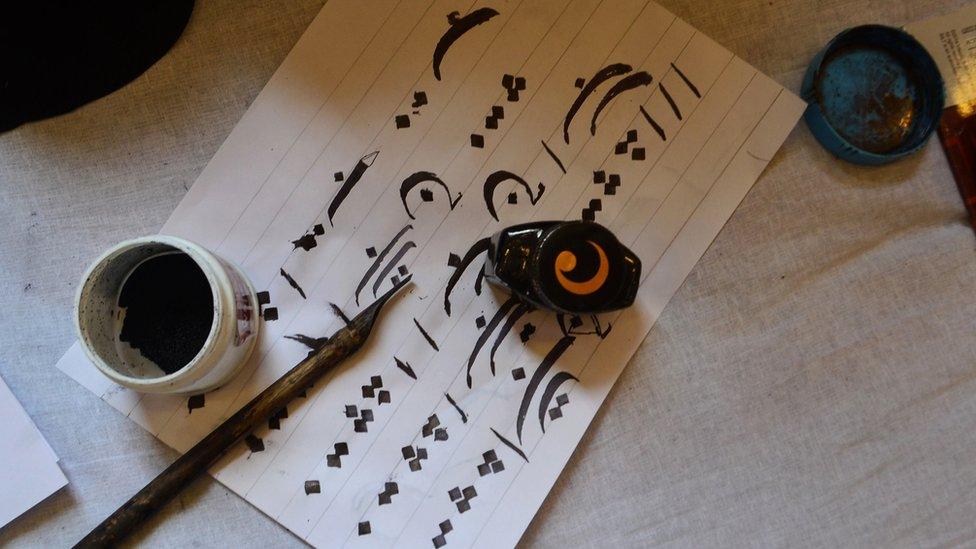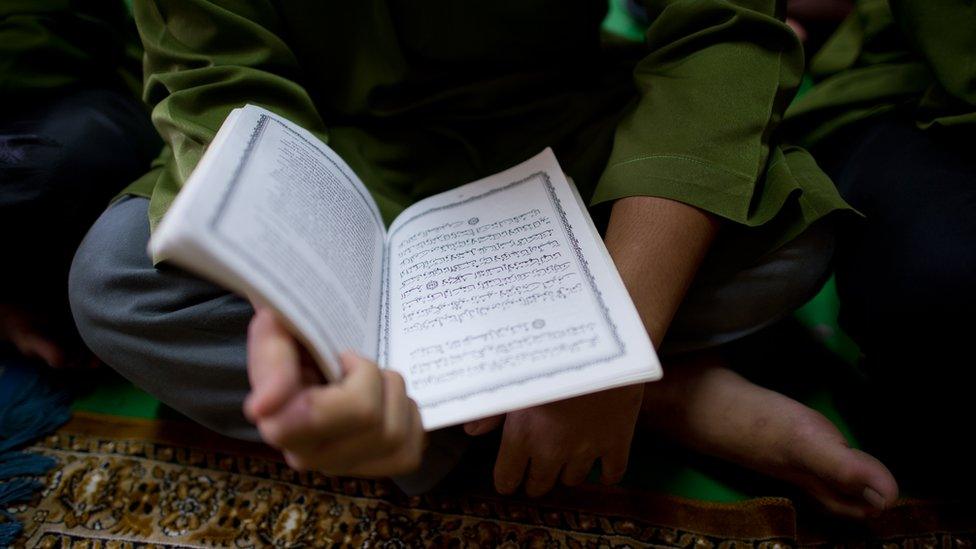Malaysians row over plans for Arabic calligraphy lessons
- Published

Khat it out - some Malaysians don't want students to have to learn Arabic calligraphy
Plans to introduce Arabic calligraphy lessons for 10-year-olds in schools in Malaysia have prompted a furious row among minority communities there, as the issue touches on the hotly-debated subjects of mother tongues and education.
Malaysia's multi-cultural society is predominantly Malay and Muslim, but just under a third of the population is Chinese, Indian, Eurasian, or from indigenous tribes.
While the majority of Malaysia's schools teach in Malay, the national language, a significant minority teach in Mandarin or Tamil and the right of minority communities to continue learning in their mother tongues is an issue that is frequently and often heatedly debated in Malaysia.
But government plans have stirred up a hornet's nest over cultural identity in the multi-cultural nation.
'Beautiful and fun'
The country's Education Ministry said in July that lessons on khat, the calligraphic form of Arabic, would be introduced in Malay lessons in year four of primary schools next year, "to train students to write beautifully and to instil an element of fun", the Malaysiakini news site reported, external.
Malay-language lessons are compulsory in all schools and the khat lessons are also meant to enhance students' knowledge of the history, art and heritage of the language, the ministry said.
Malay is commonly written with the Latin alphabet but Arabic script, known as Jawi, has also been used historically, and is still used for some administrative and religious purposes.
Many Malaysian Muslims learn it in religious education classes in order to read the Koran, which is commonly published in Jawi.

Jawi has been used for centuries in Malaysia and it was compulsory in schools until 1966
'Three languages and four writing systems'
The plans have prompted emotionally-charged debates in Malaysian media for days. At the heart of many objections to khat is a fear that the majority Malay and Muslim community will increasingly impose its culture and language on others.
Pressure groups for Tamil- and Mandarin-language schools have objected to the plans, saying the lessons would not help students improve, external their language skills and would only further burden teachers.
Grassroots leaders in the governing Democratic Action Party (DAP) - which has many Chinese members - have also questioned the plans, saying it would mean students in Tamil and Chinese schools learning "three languages and four writing systems", external.
One DAP leader said the issue was causing members "heartbreak", external and one man was even detained this week for pelting a DAP office with eggs, external and accusing the party of "betraying" the community as he did so.
The move has also been criticised by some leaders at a state level.
Politicians in Sabah and Sarawak, which have to cater for students in very remote areas, have called on the ministry to focus on more important issues, external, such as the dilapidated state of some schools, and asked to be given greater autonomy over their education policies.
Just '40 minutes in a year'
But some have also questioned the backlash to khat, pointing out that the topic takes up only six pages of a 164-page text book.
"We can choose to believe that introducing khat is part of a grand conspiracy to make everything in Malaysia more and more Malay (at the expense of other cultural identities), and pave the way for the total Islamisation of Malaysia," said one columnist in The Star newspaper, external.
"On the other end of the spectrum, we can look at the 40 minutes in one year of a year four child's life spent learning khat as nothing more whatsoever than an exercise in aesthetic appreciation and interesting cultural exposure."
You may also be interested in:
Reporting by Tse Yin Lee
Next story: 'Mystery illness' strikes Dutch wild boar
Use #NewsfromElsewhere to stay up-to-date with our reports via Twitter, external.